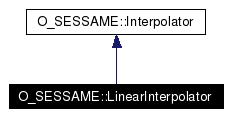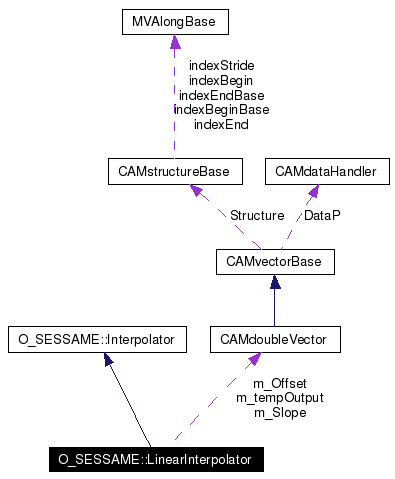
#include <LinearInterpolator.h>
Inheritance diagram for O_SESSAME::LinearInterpolator:


Works for either a single function, or Vector of functions (such as interpolating a state).
// Interpolate the sin() function // Build the sin() function int stepsize = 0.1; Vector timeVec(2*M_PI / stepsize); Matrix sinOutput(timeVec[MatrixRowsIndex].getIndexBound(), 1); for (int jj = 1; jj < timeVec[MatrixRowsIndex].getIndexBound(); ++jj) { timeVec(jj) = jj * stepsize; sinOutput(jj,1) = sin(jj * stepsize); } // Create interpolator LinearInterpolator interp(timeVec,sinOutput); Vector chk = interp.Evaluate(0.25);
Definition at line 43 of file LinearInterpolator.h.
Public Member Functions | |
| LinearInterpolator () | |
| Creates an empty linear interpolation. | |
| LinearInterpolator (const Vector &_timePoints, const Matrix &_dataPoints) | |
| Creates a linear interpolation from the data points. | |
| virtual | ~LinearInterpolator () |
| Default Deconstructor. | |
| virtual void | Interpolate (const Vector &_timePoints, const Matrix &_dataPoints) |
| Creates an interpolation from the vector of time points and matrix of corresponding data points. | |
| virtual Vector | Evaluate (const double &_inputPoint) |
| Evaluate interpolation curve at a specified time. | |
| virtual int | GetNumberDataPoints () |
| Returns the number of data points required for interpolation. | |
| virtual LinearInterpolator * | NewPointer () |
| Return a pointer to a new instance of a linear interpolator type. | |
| virtual LinearInterpolator * | Clone () |
| Return a pointer to a copy of the linear interpolator instance. | |
| virtual bool | GetValid () |
| Returns whether the current interpolation parameters are valid. | |
Protected Member Functions | |
| void | BuildLinearInterpolation (const double &_x1, const double &_y1, const double &_x2, const double &_y2, double &_Slope, double &_Offset) |
| Computes the slope and offset (intercept) of the linear interpolation given two data points. | |
| virtual void | SetNumberDataPoints (const int &_numberDataPoints) |
| Doesn't do anything for linear interpolator since there are always only 2 data points. | |
| virtual void | SetValid (const bool &_newValidValue) |
| Sets the validity value of the interpolation parameters. | |
Private Attributes | |
| int | m_NumDataPoints |
| Number of data points used for interpolation, should always be 2 for linear interpolation. | |
| int | m_NumElements |
| Number of elements in the state vector. | |
| Vector | m_Slope |
| Vector of slope parameters. | |
| Vector | m_Offset |
| Vector of offset parameters. | |
| Vector | m_tempOutput |
|
|
Creates an empty linear interpolation.
Definition at line 15 of file LinearInterpolator.cpp. Referenced by Clone(), and NewPointer(). |
|
||||||||||||
|
Creates a linear interpolation from the data points. See Interpolate Definition at line 20 of file LinearInterpolator.cpp. References Interpolate(), O_SESSAME::Matrix, O_SESSAME::MatrixColsIndex, and O_SESSAME::Vector. |
|
|
Default Deconstructor.
Definition at line 25 of file LinearInterpolator.cpp. |
|
||||||||||||||||||||||||||||
|
Computes the slope and offset (intercept) of the linear interpolation given two data points.
point1: (_x1, _y1) | point2: (_x2, _y2) Definition at line 58 of file LinearInterpolator.cpp. Referenced by Interpolate(). |
|
|
Return a pointer to a copy of the linear interpolator instance. This is used to request memory for a copy of this instance of LinearInterpolator. It is necessary when attempting to get a pointer from the abstract data type Interpolator and the actual representation type isn't known.
Implements O_SESSAME::Interpolator. Definition at line 69 of file LinearInterpolator.cpp. References LinearInterpolator(). |
|
|
Evaluate interpolation curve at a specified time. Output = m_Slope * _inputPoint + m_Offset
Implements O_SESSAME::Interpolator. Definition at line 46 of file LinearInterpolator.cpp. References CAMvectorBase::getIndexBound(), CAMdoubleVector::initialize(), m_NumElements, m_Offset, m_Slope, m_tempOutput, and O_SESSAME::Vector. |
|
|
Returns the number of data points required for interpolation. the number of data points is the number of X-values (time) required to interpolate.
Implements O_SESSAME::Interpolator. Definition at line 88 of file LinearInterpolator.h. |
|
|
Returns whether the current interpolation parameters are valid.
Definition at line 116 of file Interpolator.h. |
|
||||||||||||
|
Creates an interpolation from the vector of time points and matrix of corresponding data points.
Implements O_SESSAME::Interpolator. Definition at line 29 of file LinearInterpolator.cpp. References BuildLinearInterpolation(), CAMvectorBase::getIndexBound(), CAMdoubleVector::initialize(), m_NumElements, m_Offset, m_Slope, O_SESSAME::Matrix, O_SESSAME::Interpolator::SetValid(), TRUE, O_SESSAME::Vector, and O_SESSAME::VectorIndexBase. Referenced by LinearInterpolator(). |
|
|
Return a pointer to a new instance of a linear interpolator type. This is used to request memory for a new instance of a LinearInterpolator. It is necessary when attempting to get a pointer from the abstract data type Interpolator and the actual representation type isn't known.
Implements O_SESSAME::Interpolator. Definition at line 64 of file LinearInterpolator.cpp. References LinearInterpolator(). |
|
|
Doesn't do anything for linear interpolator since there are always only 2 data points.
Definition at line 116 of file LinearInterpolator.h. |
|
|
Sets the validity value of the interpolation parameters.
Definition at line 122 of file Interpolator.h. Referenced by Interpolate(). |
|
|
Number of data points used for interpolation, should always be 2 for linear interpolation.
Definition at line 119 of file LinearInterpolator.h. |
|
|
Number of elements in the state vector. Used to determine how many linear interpolations there are per data set. Definition at line 121 of file LinearInterpolator.h. Referenced by Evaluate(), and Interpolate(). |
|
|
Vector of offset parameters. One slope parameter per element. Definition at line 125 of file LinearInterpolator.h. Referenced by Evaluate(), and Interpolate(). |
|
|
Vector of slope parameters. One slope parameter per element. Definition at line 123 of file LinearInterpolator.h. Referenced by Evaluate(), and Interpolate(). |
|
|
Definition at line 126 of file LinearInterpolator.h. Referenced by Evaluate(). |
 1.3.9.1
1.3.9.1